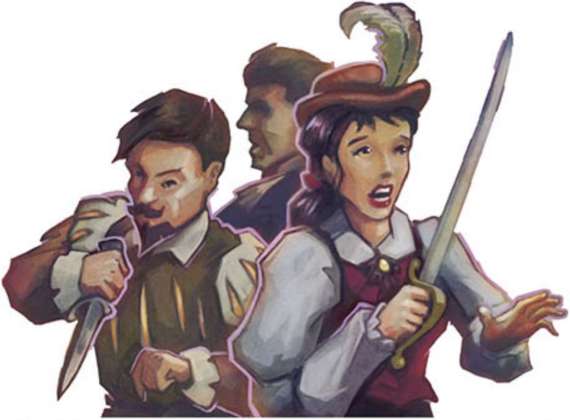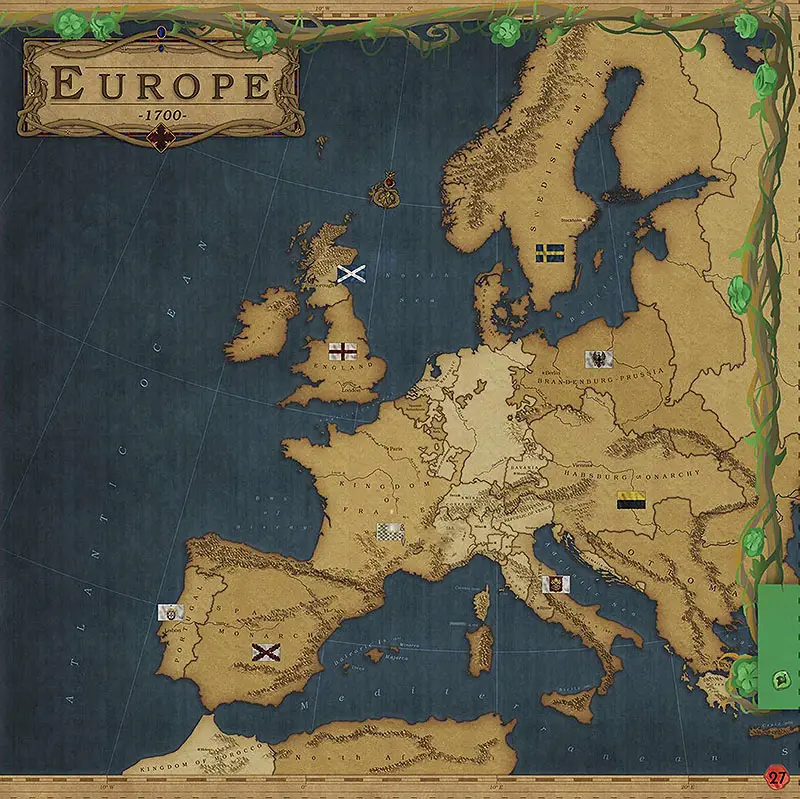
The world of Spirit Island is roughly similar to our own world's past. Details differ, but the overall trends of society and technology across the globe are broadly the same.
Europe is no exception: its politics have taken a different turn, but the customs and attitudes of its people are similar to our own history.
There is some belief in the supernatural - religion speaks of good and evil powers, there are folk customs and superstitions - but nowhere in Europe or other large empires of humanity is there a place where the stones will speak to you or trees draw up their roots and rove across the land.
It is no wonder the Invaders fail to understand Spirit Island when they arrive.
The Island
The Island has existed far longer than humans have lived there. But despite the continued existence of first-hand witnesses, assembling a coherent history is virtually impossible. Even among the most trustworthy Spirits, tales of the past are rife with contradictions, all maintained to be true.
Did Voice of the Deepest Gorge sacrifice itself, or descend to some greater destiny, or remain unchanged as an oracle of sorts? All three, apparently. Estimations of time and ordering are similarly hazy.
The Spirits
The Spirits of the Island are many and diverse: thronging wisps of breeze, strange half-seen shadows across still water, the sunbeam which forms perfect patterns even through tangled deadwood.
Most do not fight the Invaders: the smaller Spirits are too weak; the greatest ones too slow or so strong they'd destroy the Island. Some, like Watcher Acts Not, are restrained by their own nature; and others can't be bothered. Not every grove or gully has a Spirit - but there are certainly more Spirits than Dahan.
The Dahan
The Dahan were the first humans on Spirit Island. They immigrated centuries ago, in a time when Ocean's Hungry Grasp prowled nearby waters less frequently. Their lore spoke of Spirits, and they expected their new home would have some, but were greatly surprised by the Spirits' numbers, vitality, and intensity of manifestation. Some mistook the greater Spirits for gods.
The Dahan's agriculture and animals brought Blight to the land and conflict with the Spirits, triggering the First Reckoning. The Dahan capitulated quickly, and an accord was reached: the Spirits would transform crops and animals to be more compatible with the ecosystem.
The Dahan would change their methods of farming and seek counsel from friendlier Spirits. The two became neighbors, though unequal: the Dahan were reliant on and obligated to the Spirits.
The Second Reckoning
Many generations later came the Second Reckoning, when the Dahan discovered their advisors and protectors had not been entirely candid with them, and the power balance between Dahan and Spirits evened out - but that is another story. Suffice it to say that the Dahan no longer view the Spirits as gods.
The Invaders
The Invaders found Spirit Island a decade ago. Early coastal contact with the Dahan was fairly peaceful. The Dahan saw these new seafarers as analogues of their those-who-travel, and offered them appropriate hospitality. The Invaders saw a fertile, sparsely-populated island, and brought word home of a land ripe for the taking.
The first colony ships arrived five years later, bringing both settlers and an onslaught of foreign diseases which tore through the Dahan.
Spirit assistance helped many Dahan survive - but even so, as the game opens, they are just regaining their footing, mourning their dead, and discovering that these scourges were not the act of angry Spirits. They are divided on what to do: some see the Invaders as a menace to drive away, while others still think of them as our new neighbors", or are fascinated with their lifestyle, tools, and beliefs.
The larger Spirits of the Island live and act on much longer timescales than humans. The most common reaction to the Invaders arrival was oh, great, more humans - here we go again", tempered with some optimism that Spirit-speakers of the Dahan could act as intermediaries to avoid another confrontation.
But the Invaders refused to listen, and spread impossibly quickly, with more and more colony ships arriving each year. In the blink of an eye there were nearly as many Invaders as Dahan, methodically reshaping the land, destroying Spirit and Dahan alike in their heedless, swarming expansion...
You are the spirits. Can you save your island?
The Enemy Advances

Though the Adversaries may seem familar, upon closer inspection you will find that the Explorers of Spirit Island have a slighly different story to tell than your history books. The year is A.D. 1700, and the Great Powers of Europe have begun a scramble for colonies throughout the world.
In the alternate history setting of Spirit Island, this scramble is even more intense than in our own world, as historical events have transpired to lead to the rise of many major naval powers.
The Kingdom Of Brandenburg-prussia: Frederick II

Frederick William inherited the Duchy of Prussia and Electorate of Brandenburg upon the death of his father George William in December 1640.
Eschewing the ineffective and vacillatory foreign policy of his father, Frederick William abandoned the Polish Vasa dynasty and allied with King Gustavus Adolphus of Sweden against Catholic Poland. The triple alliance of Sweden, Russia, and Brandenburg-Prussia resulted in the resounding defeat of the Polish-Lithuanian Commonwealth in 1644, and its subsequent partition more than doubled the size of Prussian lands.
As a result of this victory, Frederick William, the Great Elector of Brandenburg, declared himself Frederick I, King in Prussia, and set about the process of building infrastructure and extending Prussian control throughout his newly acquired territory. Upon his death in 1701, his son Frederick II inherited a thoroughly Prussian kingdom and one of the premier European armies.
Frederick II sought to further expand Prussian territory without upsetting the continental balance of power between Sweden, Russia, France, and the Habsburgs. Building up the Prussian navy, the new king strove to catch up to other European colonial powers and quickly integrate new colonies into the Prussian economy.
The Kingdom Of England

Queen Elizabeth I of England married Robert Dudley, son of the Duke of Northumberland, in 1562. The marriage was initially a scandal due to the suspicious circumstances surrounding the death of Dudley's first wife, and inspired a revolt of several noble houses.
However, the co-monarchs Robert I and Elizabeth I grew in popularity after the suppression of the revolt in 1564 and the birth of their son Edward in 1566. With the defeat of an attempted invasion from Spain and Scotland in 1587, the Kingdom of England became one of the premier naval powers in the North Atlantic. After the death of Robert in 1588 and Elizabeth in 1603, their son Edward VII became King of England.
England was only briefly involved in the religious wars on the continent in the 17th century. Following a disastrous invasion attempt in France in 1633 and a clash with Scotland in 1651, the Kingdom of England focused on fortifying the Scottish frontier and building up its naval power.
Unable to project power on the continent and constrained to southern Britain, the Kingdom of England was one of the first to seek colonies in the New World, using its overseas possessions to provide citizens with opportunities that were increasingly hard to come by at home.
Kingdom Of Sweden: King Erik XV

Following his triumph at the Battle of Lutzen in 1632, King Gustavus Adolphus led the Kingdom of Sweden to further victories over Catholic armies, defeating and partitioning the Polish-Lithuanian Commonwealth with Brandenburg and Russia in 1644.
Following his death in 1651, Gustavus Adolphus was succeeded by his son, King Gustav III, who went on to defeat Kingdom of Denmark in a series of campaigns between 1657 and 1668 and secure total Swedish dominion over the Baltic Sea.
Gustav III was succeeded by his son Erik in 1683, who became the eighth Vasa ruler of Sweden. Under his rule, constrained from further growth on the continent by Russia to their East and the Holy Roman Empire and Prussia to their south, Sweden begun leveraging their powerful navy to set up colonies throughout the world.
The absorption of former Polish lands in the eastern Baltic has given Sweden a significant influx of Slavs and other non-Scandanavian people.
While a tremendous boon to their economic and military power, this demographic shift has also been a source of internal turmoil as the Kingdom of Sweden attempts the historically difficult task of integrating a multi-ethnic society. Along with a desire for more natural resources, Sweden's desire for a "safety valve outlet for discontents and political agitators has driven their desire to establish themselves as a colonial power.

Continue Reading
